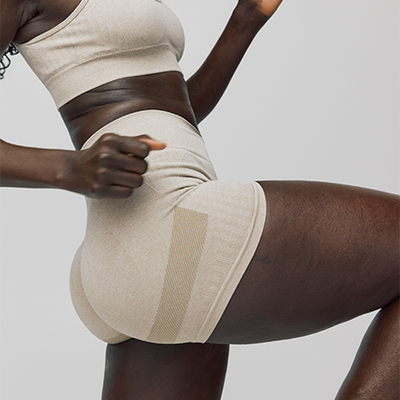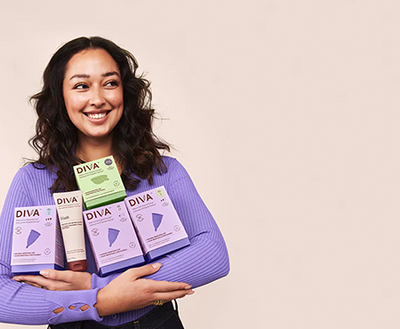
In this article /
DIVA continues to strive for a more inclusive product and consumer experience. Gender affirming care saves lives, and we want to do our part to reduce feelings of gender dysphoria and support the gender diversity of people who menstruate.
The SHORE Centre (formerly Planned Parenthood Kitchener-Waterloo) supports LGBTQ2S+ by providing inclusive education, counseling, and medical care. We spoke to executive director, TK Pritchard, about gender-affirming care, gender dysphoria and menstruation, and what DIVA can do to support menstruators of all gender identities.
Similarly, gender dysphoria is often centralized as the key indicator of trans identity and expressed mostly in media as hatred of one’s body. But experiences of gender dysphoria vary widely both in frequency and feel.
With that in mind, we have to make space for the wide diversity of trans experiences and also understand that it’s important to strive to all have spaces, services, and products, be gender-affirming, including everything from overall healthcare—with a particular need for inclusive care, which may induce more gender dysphoria, such as paps or birth control access—to trans and non-binary competent mental health care, inclusive schools, workplaces, and more.
Menstruation has often been framed as an experience only women/girls have, and commercials, products, education, and related have not (and often still don’t) include trans and non-binary people.
As a trans/non-binary person who menstruates, I have experienced a wide range of feelings related to my period—including it being used as a way to invalidate my identity. It has taken a long time for me to feel comfortable talking about menstruating, to feel like it isn’t a direct challenge to my gender, and I feel that so much of this has to do with the limited representation of trans and non-binary people in period products, education and more.
We also tend to focus solely on gender dysphoria and never on gender euphoria. It’s important that we don’t invalidate the feelings of dysphoria or how hard it can be but we can also make space to be celebratory and wildly comfortable in our bodies.
While I have a lot of privilege in my life which allows this to be true, I am at a point where I am very proud to be a trans/non-binary person who menstruates—I am more than happy to talk about my period and no longer see it as a challenge to my identity. Periods can absolutely create gender dysphoria, but I often wonder how much we could reduce that if we worked harder to normalize and celebrate that people of all genders can menstruate!
This can be as simple as changing our language to include menstruators of all genders, ensuring all kids receive education about periods, thinking about the pictures and diagrams we use and which bodies they include, and generally creating spaces where all youth can feel comfortable talking/ asking questions about periods.
More generally in work/school/community, it’s important to have period products/ disposal options available in all washrooms.
When clients reach out for our services, we always ask about pronouns, preferences for what kinds of language our clinicians should use/avoid when referring to their bodies, and anything else we can do to make them feel supported.
I also try to be visible as a trans person who is in a leadership position and am always open to feedback about how we can better serve our LGBTQ youth and non-binary communities.
There needs to be an overall shift to understanding that people of all genders can menstruate. That “period power” can be experienced by more than just women and girls—and that ultimately we are all working towards the same goal of menstrual equity. From product development, market research, partnership development, advertising and more, there is a great need to include trans and non-binary perspectives.
We are experiencing a global attack on trans folks, particularly transgender youth, and now is a great time to stand strong together, loudly!
The SHORE Centre (formerly Planned Parenthood Kitchener-Waterloo) supports LGBTQ2S+ by providing inclusive education, counseling, and medical care. We spoke to executive director, TK Pritchard, about gender-affirming care, gender dysphoria and menstruation, and what DIVA can do to support menstruators of all gender identities.
DIVA: What misconceptions exist around gender-affirming care, gender dysphoria, and menstruation?
TK Pritchard: Often when folks hear about access to gender-affirming care they assume we mean only access to hormone therapies and surgeries, and not full-spectrum, inclusive care and services. While access to both can be very important on some people’s journeys—they aren’t part of everyone’s stories or needs.Similarly, gender dysphoria is often centralized as the key indicator of trans identity and expressed mostly in media as hatred of one’s body. But experiences of gender dysphoria vary widely both in frequency and feel.
With that in mind, we have to make space for the wide diversity of trans experiences and also understand that it’s important to strive to all have spaces, services, and products, be gender-affirming, including everything from overall healthcare—with a particular need for inclusive care, which may induce more gender dysphoria, such as paps or birth control access—to trans and non-binary competent mental health care, inclusive schools, workplaces, and more.
Menstruation has often been framed as an experience only women/girls have, and commercials, products, education, and related have not (and often still don’t) include trans and non-binary people.
As a trans/non-binary person who menstruates, I have experienced a wide range of feelings related to my period—including it being used as a way to invalidate my identity. It has taken a long time for me to feel comfortable talking about menstruating, to feel like it isn’t a direct challenge to my gender, and I feel that so much of this has to do with the limited representation of trans and non-binary people in period products, education and more.
We also tend to focus solely on gender dysphoria and never on gender euphoria. It’s important that we don’t invalidate the feelings of dysphoria or how hard it can be but we can also make space to be celebratory and wildly comfortable in our bodies.
While I have a lot of privilege in my life which allows this to be true, I am at a point where I am very proud to be a trans/non-binary person who menstruates—I am more than happy to talk about my period and no longer see it as a challenge to my identity. Periods can absolutely create gender dysphoria, but I often wonder how much we could reduce that if we worked harder to normalize and celebrate that people of all genders can menstruate!
D: What can we advocate for at work, in school, and more, to encourage greater inclusivity and minimize experiences of gender dysphoria?
TKP: It’s essential that we frame education about periods in a way that connects with all young people, and recognizes that people of all genders can have periods. Conversations that are inclusive of transgender people and non-binary experiences can help to ensure all youth who menstruate feel seen and represented.This can be as simple as changing our language to include menstruators of all genders, ensuring all kids receive education about periods, thinking about the pictures and diagrams we use and which bodies they include, and generally creating spaces where all youth can feel comfortable talking/ asking questions about periods.
More generally in work/school/community, it’s important to have period products/ disposal options available in all washrooms.
D: What resources can an organization like the SHORE Centre provide to people navigating feelings of gender dysphoria?
TKP: SHORE Centre provides inclusive education, counseling, and medical care. We work to ensure that every interaction with the organization is providing the most trans and non-binary-inclusive experience we can. We strive to teach and create resources using language which includes all bodies and experiences and doesn’t typically gender our information.When clients reach out for our services, we always ask about pronouns, preferences for what kinds of language our clinicians should use/avoid when referring to their bodies, and anything else we can do to make them feel supported.
I also try to be visible as a trans person who is in a leadership position and am always open to feedback about how we can better serve our LGBTQ youth and non-binary communities.
D: What could the menstrual care industry do to be more inclusive of a diversity of experiences?
TKP: In the past few years we have seen great strides from some period product companies to include trans and non-binary people in their advertisements and website product photos, which is a great step forward! Representation has a huge impact on normalizing and reducing stigma. Thinking about language as well is important. I’d also love to see more period product companies be vocal about their support for trans and non-binary rights.There needs to be an overall shift to understanding that people of all genders can menstruate. That “period power” can be experienced by more than just women and girls—and that ultimately we are all working towards the same goal of menstrual equity. From product development, market research, partnership development, advertising and more, there is a great need to include trans and non-binary perspectives.
We are experiencing a global attack on trans folks, particularly transgender youth, and now is a great time to stand strong together, loudly!





















